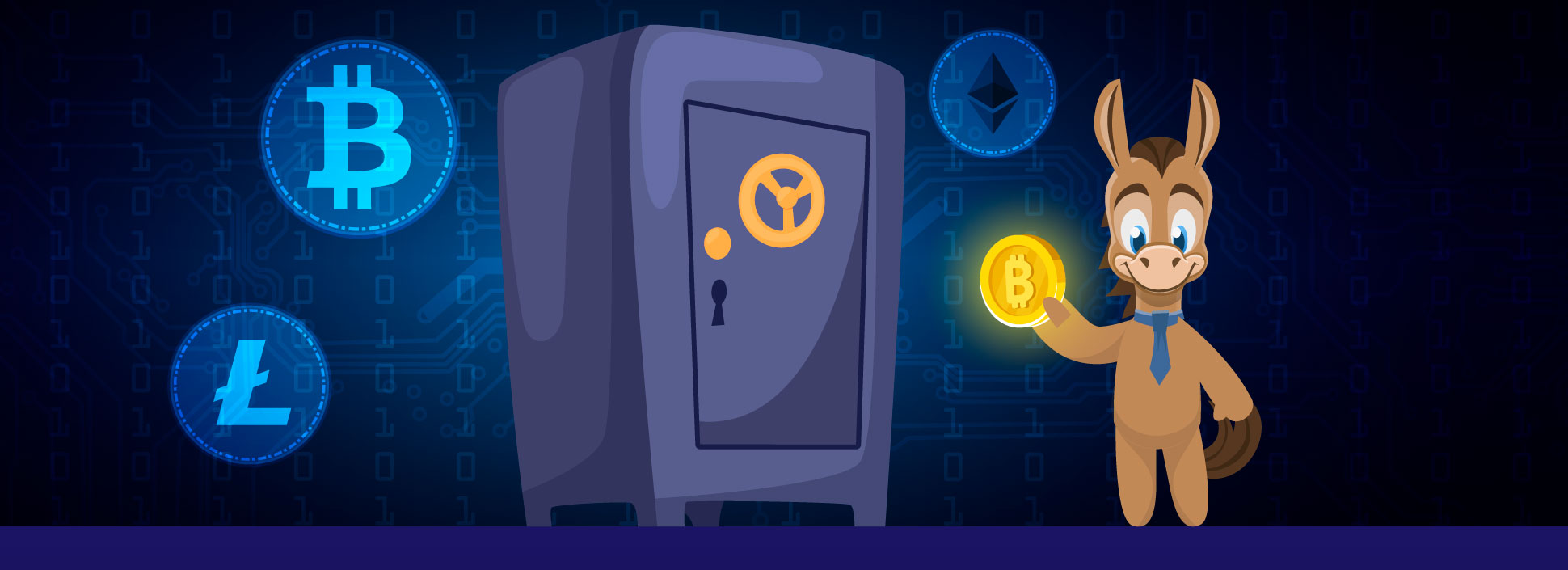Introduction
As the popularity of cryptocurrencies continues to rise, the need for a secure and reliable cryptocurrency wallet becomes paramount. A cryptocurrency wallet is a digital tool that allows users to safely store, send, and receive their digital assets. With numerous options available on the market, it can be overwhelming to find the best cryptocurrency wallet that suits your needs.
In this article, we will explore the different types of cryptocurrency wallets and highlight the key factors to consider when choosing one. Additionally, we will provide an overview of popular cryptocurrency wallets in each category to help you make an informed decision.
Whether you are a seasoned cryptocurrency enthusiast or just starting your journey in the world of digital assets, having a trustworthy and user-friendly wallet is crucial to safeguard your investments. By understanding the various wallet options and their features, you can ensure the security of your cryptocurrencies while enjoying easy accessibility and seamless transactions.
So, let’s delve into the world of cryptocurrency wallets and discover the best options available to protect and manage your digital assets.
What is a cryptocurrency wallet?
A cryptocurrency wallet is a software program or physical device that allows users to securely store, manage, and interact with their digital currencies. It serves as a digital vault where users can store their private keys – the secret codes that grant access to their cryptocurrency holdings.
Contrary to traditional wallets that store physical cash, a cryptocurrency wallet does not actually store the digital coins themselves. Instead, it stores the private keys that enable users to access and control their digital assets securely.
When a user wants to initiate a transaction, whether it’s sending or receiving cryptocurrencies, the wallet utilizes the private keys to sign the transaction and validate its authenticity. The transaction details are then recorded on the blockchain, a decentralized and transparent public ledger that verifies and maintains a record of all cryptocurrency transactions.
It is important to note that cryptocurrencies exist on the blockchain network, and the wallet is simply a tool that allows users to interact with their digital assets. This means that even if a user’s wallet is lost or stolen, as long as they have their private keys or seed phrase (a backup of the keys), they can recover their funds and regain access to their cryptocurrencies.
Cryptocurrency wallets come in different forms, including hardware wallets, desktop wallets, mobile wallets, web wallets, and paper wallets. Each type offers its own set of advantages and features, catering to different user preferences and needs. As the cryptocurrency market continues to evolve and new features are introduced, wallet developers strive to enhance security measures, improve user experience, and support a wider range of cryptocurrencies.
Now that we have a basic understanding of what a cryptocurrency wallet is, let’s explore the different types of wallets available and delve into their unique characteristics and functionalities.
Types of cryptocurrency wallets
There are several types of cryptocurrency wallets available in the market, each with its own advantages and features. Here are the most common types:
- Hardware wallets: Hardware wallets are physical devices that are specifically designed to securely store cryptocurrency private keys offline. These devices offer the highest level of security as they are not connected to the internet, making them immune to online threats such as hacking or malware. Some popular hardware wallets include Trezor, Ledger, and KeepKey.
- Desktop wallets: Desktop wallets are software programs that are installed on a user’s desktop computer or laptop. These wallets provide users with full control over their private keys and offer a higher level of security compared to online wallets. Desktop wallets are suitable for users who prefer to have their digital assets securely stored on their own devices. Examples of desktop wallets include Electrum, Exodus, and Atomic Wallet.
- Mobile wallets: Mobile wallets are applications that can be installed on smartphones or tablets. These wallets provide convenient access to cryptocurrencies on the go. Mobile wallets are user-friendly and typically offer additional features such as QR code scanning for quick transactions. While mobile wallets are convenient, they may be less secure than hardware or desktop wallets due to the potential vulnerabilities of mobile devices. Popular mobile wallets include Trust Wallet, Mycelium, and Coinomi.
- Web wallets: Web wallets are online wallets that can be accessed through a web browser. These wallets are often provided by cryptocurrency exchanges or third-party wallet service providers. Web wallets offer easy accessibility from any device with an internet connection, but they are considered less secure as the private keys are stored and managed by a third party. It is important to choose reputable web wallet providers to minimize security risks. Examples of web wallets include Coinbase Wallet, Blockchain.com, and MyEtherWallet.
- Paper wallets: Paper wallets involve printing or writing down the public and private keys on a piece of paper. As the keys are not stored electronically, paper wallets are considered highly secure and immune to online attacks. However, paper wallets require careful handling and storage to prevent loss or damage. Paper wallets can be generated using online services like Bitaddress.org or through specialized hardware devices.
These are the main types of cryptocurrency wallets available. Each type has its own strengths and weaknesses, and the choice of wallet depends on factors such as security preferences, convenience, and the level of control the user wants over their digital assets.
Hardware wallets
Hardware wallets are physical devices designed to provide the highest level of security for storing cryptocurrencies. They are often shaped like USB sticks and come with built-in encryption and secure key storage capabilities.
One of the key advantages of hardware wallets is that they store the private keys offline, away from potential online threats. This means that even if your computer or smartphone is compromised, hackers cannot access your private keys without physical possession of the hardware wallet.
Hardware wallets also offer additional security features such as PIN codes and recovery phrases, which provide an added layer of protection in case the device is lost or stolen. When setting up a hardware wallet, users are usually required to create a recovery phrase, which can be used to restore access to their funds on a different device in case their hardware wallet is damaged or misplaced.
Some popular hardware wallet options include:
- Trezor: Trezor is a well-known hardware wallet brand that offers a range of devices, including the Trezor One and Trezor Model T. Trezor wallets are known for their user-friendly interface and robust security features.
- Ledger: Ledger produces hardware wallets such as the Ledger Nano S and Ledger Nano X. These devices support a wide range of cryptocurrencies and offer an intuitive user experience, making them a popular choice among cryptocurrency enthusiasts.
- KeepKey: KeepKey is another reputable hardware wallet manufacturer with its device featuring a large screen for easy visibility and accessibility. KeepKey offers a secure and user-friendly experience for storing cryptocurrencies.
Hardware wallets are ideal for those who prioritize security and want full control over their private keys. They provide peace of mind by keeping your cryptocurrencies isolated from potential online threats, making them an essential tool for long-term storage and investment purposes.
Desktop wallets
Desktop wallets are software applications installed on a user’s computer or laptop to store and manage cryptocurrencies. They provide users with full control over their private keys, offering a higher level of security compared to online wallets.
One of the key advantages of desktop wallets is that they allow users to maintain complete ownership and control over their digital assets. The private keys are stored locally on the user’s device, reducing the risk of online hacks or data breaches. Desktop wallets also offer offline accessibility, meaning users can access their cryptocurrencies even without an internet connection.
When choosing a desktop wallet, it is crucial to select one from a reputable and trusted developer. Popular desktop wallet options include:
- Electrum: Electrum is a well-established and widely used desktop wallet for Bitcoin. It is known for its lightweight design, fast performance, and strong security features. Electrum also supports hardware wallet integration for added security.
- Exodus: Exodus is a user-friendly desktop wallet that supports a wide range of cryptocurrencies. It offers a visually appealing interface and features like built-in exchange, portfolio tracking, and a secure backup system. Exodus aims to provide a seamless and intuitive experience for both beginners and advanced users.
- Atomic Wallet: Atomic Wallet is a multi-currency desktop wallet that supports various cryptocurrencies. It offers advanced security features like atomic swaps and decentralized exchanges. Atomic Wallet also provides users with access to staking services, allowing them to earn passive income on supported cryptocurrencies.
Desktop wallets are suitable for users who prefer having their digital assets stored locally on their devices, providing them with direct control over their funds. However, it is important to note that desktop wallets can be vulnerable to malware or computer viruses. Therefore, it is essential to keep your computer’s operating system and security software up to date and practice safe browsing habits to minimize any potential risks.
Desktop wallets are a great option for users seeking heightened security and accessibility to their cryptocurrencies, especially for those who regularly access their funds from a single device.
Mobile wallets
Mobile wallets are smartphone applications designed to store and manage cryptocurrencies on the go. These wallets offer convenience and portability, allowing users to access and transact with their digital assets anytime and anywhere.
Mobile wallets provide a user-friendly interface and are well-suited for users who frequently use cryptocurrencies for everyday transactions. They offer features like QR code scanning, which simplifies the process of sending and receiving cryptocurrencies.
One of the advantages of mobile wallets is that they are typically designed with enhanced security measures. They may feature biometric authentication, such as fingerprint or facial recognition, to secure access to the wallet. Some mobile wallets also offer seed phrase backup options, enabling users to restore their funds if their device is lost or stolen.
There are various mobile wallet options available, catering to different platforms and supported cryptocurrencies. Here are a few popular mobile wallet choices:
- Trust Wallet: Trust Wallet is a mobile wallet acquired by Binance, one of the leading cryptocurrency exchanges. It supports a wide range of cryptocurrencies and offers built-in decentralized exchange (DEX) functionality. Trust Wallet focuses on providing a secure and intuitive experience for users.
- Mycelium: Mycelium is a mobile wallet specifically designed for Bitcoin. It offers advanced features like coin control and hardware wallet integration. Mycelium is known for its robust security measures and is a favorite among Bitcoin enthusiasts.
- Coinomi: Coinomi is a multi-currency mobile wallet that supports hundreds of cryptocurrencies. It offers a user-friendly interface and incorporates strong encryption and privacy features. Coinomi also provides users with the ability to exchange cryptocurrencies within the wallet.
Mobile wallets are suitable for users who prefer the convenience of accessing their cryptocurrencies on the go and frequently engaging in mobile transactions. However, it is important to note that mobile devices can be susceptible to malware, phishing attacks, or physical loss. Users should implement security measures such as setting strong passwords, keeping software up to date, and being cautious of downloading apps from untrusted sources.
With the increasing popularity of smartphones, mobile wallets have become a widely used option for managing cryptocurrencies due to their accessibility and ease of use.
Web wallets
Web wallets, also known as online wallets, are cryptocurrency wallets that can be accessed through a web browser. These wallets provide users with the convenience of accessing their digital assets from any device with an internet connection, making them highly accessible and user-friendly.
One of the key features of web wallets is that they are typically provided by cryptocurrency exchanges or third-party wallet service providers. This integration allows users to easily manage their cryptocurrencies alongside trading and exchange functionalities offered by these platforms.
Web wallets offer a range of features, including the ability to send and receive cryptocurrencies, view transaction history, and manage multiple wallet addresses. Some web wallets even support additional features like trading and staking.
It is important to note that web wallets, while convenient, inherently pose greater security risks compared to hardware or desktop wallets. As the private keys are stored online, users are entrusting the security of their digital assets to the wallet service provider. It is essential to choose reputable and trustworthy web wallet providers to ensure the safety and integrity of your cryptocurrencies.
Here are a few popular web wallet options:
- Coinbase Wallet: Coinbase Wallet is a web wallet and mobile wallet offered by Coinbase, one of the largest cryptocurrency exchanges. It provides users with a simple and intuitive interface to securely store and manage various cryptocurrencies. Coinbase Wallet also supports decentralized applications (DApps) integration.
- Blockchain.com: Blockchain.com is a renowned web wallet provider that offers a user-friendly interface and supports Bitcoin, Ethereum, and Bitcoin Cash. The wallet provides users with full control over their private keys and offers features such as seamless integration with the Blockchain.com exchange and easy backup and recovery options.
- MyEtherWallet: MyEtherWallet (MEW) is a popular web wallet specifically designed for managing Ethereum and ERC-20 tokens. It allows users to create and manage multiple Ethereum addresses, interact with smart contracts, and securely store their private keys locally. MEW also supports hardware wallet integration for enhanced security.
Web wallets are well-suited for users who value convenience and accessibility, particularly those who frequently trade or exchange cryptocurrencies on online platforms. While utilizing a web wallet, it is crucial to follow best security practices, such as enabling two-factor authentication (2FA), using strong passwords, and regularly updating your login credentials.
Overall, web wallets provide a convenient solution for managing cryptocurrencies online, but it is imperative to choose trusted providers and implement proper security measures to safeguard your digital assets.
Paper wallets
Paper wallets offer an offline method for securely storing cryptocurrencies. They are physical documents that contain printed or handwritten information, including the public and private keys necessary to access and manage the digital assets.
The primary advantage of paper wallets is their high level of security. Since the private keys are stored offline, they are not susceptible to hacking or online threats. Paper wallets provide an air-gapped storage solution, making them an ideal choice for long-term cold storage of cryptocurrencies.
To create a paper wallet, users can generate a pair of keys using offline software or dedicated paper wallet generators available online. The user then prints the public and private keys on a piece of paper, ensuring that it is stored securely and protected from physical damage or unauthorized access.
Despite their high level of security, paper wallets do come with certain considerations and risks. Users must ensure that the generation process is done on a trusted and malware-free device. It is crucial to keep the paper wallet in a safe and secure location, protecting it from fire, water damage, or theft. Additionally, if the paper wallet is lost or damaged, users may permanently lose access to their funds unless they have made proper backup copies.
Here are a few key points to consider when using paper wallets:
- Publicly viewable: The public address, which is the wallet’s receive address, can be freely shared with others. It allows anyone to send funds to the wallet but does not compromise the security of the wallet.
- Security measures: Users can enhance the security of paper wallets by encrypting or password-protecting the private keys before printing or storing them.
- Single-use wallets: Paper wallets are designed for one-time use. Once funds are transferred from a paper wallet, it is recommended to create a new one for future transactions.
While paper wallets offer excellent security, they may not be the most convenient option for everyday use or frequent transactions. They are best suited for long-term storage of cryptocurrencies that are not intended for regular spending.
Users who opt for a paper wallet should be comfortable with the process of generating and securely storing physical documents. It is crucial to follow best practices and maintain a thorough understanding of how to use and protect paper wallets to ensure the safety of your digital assets.
Key factors to consider when choosing a cryptocurrency wallet
When selecting a cryptocurrency wallet, it is vital to consider several key factors to ensure the security, functionality, and convenience of managing your digital assets. Here are the essential factors to consider:
- Security: Security should be your top priority when choosing a cryptocurrency wallet. Look for wallets that offer strong encryption, two-factor authentication (2FA), and storage of the private keys offline. Additionally, consider the track record and reputation of the wallet provider to ensure they have a history of implementing robust security measures.
- User-friendliness: Consider the user experience and interface of the wallet. A user-friendly wallet with an intuitive design and easy navigation can enhance your overall experience and simplify the management of your cryptocurrencies.
- Supported cryptocurrencies: Different wallets support various cryptocurrencies, so it’s important to choose one that is compatible with the specific cryptocurrencies you own or plan to use. Ensure that the wallet supports the necessary protocols and has a good reputation for successfully integrating new coins or tokens.
- Backup and recovery options: Accidents can happen, and it’s crucial to have proper backup and recovery options in place. Look for wallets that offer seed phrases or recovery phrases, which are sets of words that can be used to restore your wallet in case of loss or damage to the original device.
- Development team and community support: Consider the reputation and credibility of the wallet’s development team. A wallet that has an active development team and a strong community of users can ensure ongoing updates, bug fixes, and improvements. Regular updates are important in maintaining the security and functionality of the wallet.
By considering these key factors, you can make an informed decision when choosing a cryptocurrency wallet that meets your specific needs and aligns with your security preferences.
Security
When it comes to choosing a cryptocurrency wallet, security is of utmost importance. Given the decentralized and irreversible nature of cryptocurrency transactions, ensuring the safety of your digital assets is essential. Here are some key security considerations to keep in mind:
Encryption: Look for wallets that utilize strong encryption algorithms to protect your private keys and transaction data. Encryption plays a crucial role in safeguarding your funds from unauthorized access or theft.
Two-factor authentication (2FA): Two-factor authentication adds an extra layer of security by requiring a second method of verification, typically through a text message, email, or authenticator app. Enabling 2FA can significantly reduce the risk of unauthorized access to your wallet.
Offline storage: Wallets that store the private keys offline, such as hardware wallets or paper wallets, offer a higher level of security. By keeping the keys away from internet-connected devices, you minimize the risk of online attacks and hacking attempts.
Backup and recovery options: It is crucial to choose a wallet that provides reliable backup and recovery options. Look for wallets that generate seed phrases or recovery phrases, a series of words that can be used to restore your wallet in case of loss or damage to your device. Make sure to properly store and secure these phrases separately from your wallet.
Open-source audibility: Open-source wallets allow the code to be audited and reviewed by the community, enhancing transparency and security. Audibility enables users and security experts to identify any potential vulnerabilities or weaknesses in the wallet’s code.
Reputation and track record: Consider the reputation and track record of the wallet provider. Research and read user reviews, check for any previous security breaches or vulnerabilities, and ensure that the wallet has a good standing within the cryptocurrency community.
Regular updates: Select wallets that have an active development team and regularly release updates. Timely updates are crucial for fixing any security vulnerabilities and ensuring the wallet remains secure against emerging threats.
Remember, no wallet is completely immune to security risks. However, by choosing a wallet that implements strong security measures and following best practices, you can significantly mitigate the risk of unauthorized access or loss of your cryptocurrencies.
User-friendliness
When selecting a cryptocurrency wallet, user-friendliness is an important factor to consider. A user-friendly wallet can greatly enhance your experience and make managing your digital assets more convenient and accessible. Here are some aspects to look for when evaluating the user-friendliness of a wallet:
Intuitive interface: Choose a wallet with a clean and intuitive interface that is easy to navigate. A well-designed interface reduces the learning curve and allows you to quickly understand how to perform essential functions such as sending and receiving funds.
Simplified setup process: The wallet should have a straightforward setup process, enabling you to create an account and set up security features without unnecessary complications. Clear instructions and guidance during the setup phase can ensure a smooth onboarding experience.
Transaction management: A user-friendly wallet should make it easy to manage your transactions. It should display transaction history, allow you to view transaction details, and provide clear options to send or receive funds. The wallet’s user interface should guide you through the process in a straightforward and understandable way.
QR code scanning: Look for wallets that offer QR code scanning capability. This feature makes it convenient to scan QR codes to initiate transactions, eliminating the need to manually enter lengthy cryptocurrency addresses.
Multi-asset support: If you hold multiple cryptocurrencies, a user-friendly wallet should support a wide range of currencies. This allows you to manage all your digital assets within a single platform, simplifying the management process and reducing the need for multiple wallets.
Language and regional support: Consider whether the wallet is available in your preferred language and supports your geographic region. Language support ensures that you can easily navigate and understand the wallet’s features, while regional support may offer additional functionalities such as local fiat currency conversion.
Customer support: Evaluate the level of customer support provided by the wallet’s developer. Look for wallets that offer responsive customer support channels, such as email or live chat, to address any concerns or issues that may arise during your usage of the wallet.
By selecting a user-friendly wallet, you can streamline your cryptocurrency management experience and make it more enjoyable. It allows you to focus on the essential aspects of managing your digital assets without getting overwhelmed by complex interfaces or complicated processes.
Supported cryptocurrencies
When choosing a cryptocurrency wallet, it is essential to consider the supported cryptocurrencies. Not all wallets support the same digital currencies, and compatibility with the specific cryptocurrencies you own or plan to use is crucial. Here are some key points to keep in mind:
Bitcoin and major cryptocurrencies: Most wallets support popular cryptocurrencies like Bitcoin (BTC), Ethereum (ETH), Ripple (XRP), Litecoin (LTC), and Bitcoin Cash (BCH). These cryptocurrencies have a large user base and are commonly supported across various wallet platforms.
Altcoins and niche cryptocurrencies: If you hold altcoins or niche cryptocurrencies, it is important to check if the wallet you are considering supports these specific digital currencies. Altcoins are alternative cryptocurrencies other than Bitcoin, such as Cardano (ADA), Stellar (XLM), or Dogecoin (DOGE). Wallets like Trust Wallet and Atomic Wallet support a wide range of altcoins, while others may have a more limited selection.
Token support: Cryptocurrency wallets should also support the tokens based on blockchain platforms like Ethereum (ERC-20 tokens) or Binance Smart Chain (BEP-20 tokens). These tokens are assets built on top of existing blockchain networks and enable various functionalities within decentralized applications (DApps).
Multi-currency wallets: Some wallets are designed to support a broad range of cryptocurrencies, providing users with the convenience of managing multiple digital assets within a single wallet. These wallets offer greater flexibility and eliminate the need to juggle multiple wallets for different coins.
Compatibility with specific protocols: Certain cryptocurrencies utilize unique protocols or technologies that require specific wallet support. For example, if you plan to store and interact with decentralized finance (DeFi) protocols, ensure that the wallet you choose supports the necessary infrastructure, such as MetaMask for Ethereum-based DeFi applications.
Stay updated: Keep in mind that cryptocurrency projects are constantly evolving, and new coins and tokens are regularly introduced. Ensure that the wallet you choose stays updated and actively adds support for emerging cryptocurrencies to expand your investment options.
By considering the supported cryptocurrencies, you can ensure that your chosen wallet allows you to store and manage the specific digital assets you own or plan to acquire. Compatibility with your desired cryptocurrencies is crucial for a seamless and efficient cryptocurrency management experience.
Backup and recovery options
When choosing a cryptocurrency wallet, it is crucial to consider the backup and recovery options provided. Accidents and unforeseen events can occur, such as losing your device, experiencing hardware failure, or encountering a software glitch. Having reliable backup and recovery options in place is essential to avoid permanently losing access to your digital assets. Here are some key points to consider:
Seed phrases or recovery phrases: Many wallets use seed phrases or recovery phrases, which consist of a sequence of words that serve as a backup copy of your private keys. These phrases allow you to restore your wallet in case your device is lost, stolen, or damaged. It is crucial to write them down and store them securely in a separate location from your device.
Hardware wallet compatibility: If you opt for a hardware wallet, check if it supports the recovery process on different devices. This ensures that you can restore your wallet on a new device if necessary, using your recovery phrases or backup files.
Backup file encryption: Some wallets allow you to create encrypted backup files. Encrypting your backup adds an extra layer of security, protecting your private keys from unauthorized access if the backup file falls into the wrong hands.
Regular backups: To minimize the risk of potential data loss, it is important to regularly perform backups. Establish a routine to backup your wallet, whether it be weekly or monthly, depending on your frequency of transactions. Remember to test the restoration process periodically to ensure that your backups are working effectively.
Wallet synchronization: Some wallets require synchronization with the blockchain network to access your funds. When choosing a wallet, consider how this process affects the backup and recovery options. Ensure that you understand the steps required to resynchronize your wallet after recovering from a backup.
Third-party backup services: Some wallets offer integration with third-party backup services, which provide additional convenience and security. These services often encrypt and store your backup files securely, adding an extra layer of protection to your wallet backups.
Backing up your wallet and having the ability to restore it are fundamental aspects of cryptocurrency ownership. Without proper backup and recovery options, you risk permanently losing your digital assets. Ensure that the wallet you choose provides reliable and convenient backup and recovery mechanisms, allowing you to regain access to your funds in case of any unforeseen circumstances.
Development team and community support
When choosing a cryptocurrency wallet, it is important to consider the development team behind the wallet and the level of community support it receives. The development team plays a crucial role in maintaining the wallet’s security, functionality, and ongoing updates. Community support indicates the active engagement and trust of users in the wallet’s ecosystem. Here are some key factors to consider:
Reputation and credibility: Research the reputation and credibility of the development team behind the wallet. Look for information about the team members, their expertise, and their involvement in the cryptocurrency community. A reputable team with a track record of delivering secure and reliable wallets enhances confidence in the wallet’s quality.
Transparency and open-source: Consider whether the wallet is open-source, meaning the code is publicly available for scrutiny and review. Open-source wallets are more transparent, as security experts and the wider community can audit and identify any potential vulnerabilities. This helps ensure the wallet’s integrity and reduces the risk of hidden exploits.
Ongoing development and updates: Assess the frequency of updates and releases from the development team. Regular updates are crucial for addressing security vulnerabilities, bug fixes, and adding new features. An active development team indicates a commitment to maintaining and improving the wallet over time.
Community engagement and support: Look for evidence of an active and supportive community around the wallet. This can be assessed by checking community forums, social media channels, and user reviews. A strong community indicates that users are actively engaged and satisfied with the wallet’s performance and features.
User feedback and responsiveness: Consider how responsive the development team is to user feedback and bug reports. A team that actively listens to user suggestions and quickly addresses issues demonstrates a commitment to providing a reliable and user-friendly wallet experience.
Partnerships and integrations: Evaluate if the wallet has formed partnerships or integrations with other reputable cryptocurrency projects and service providers. Collaborations with established entities indicate a strong industry presence and reinforce the wallet’s credibility.
Choosing a wallet with a reliable development team and a supportive community ensures that you have access to regular updates, timely bug fixes, and a wealth of user knowledge and experiences. Active community engagement also helps foster a vibrant ecosystem where users can seek assistance, share insights, and stay informed about security best practices.
By considering these factors, you can select a cryptocurrency wallet that not only meets your security and functionality requirements but also offers ongoing development and strong community support to enhance your overall user experience.
Popular cryptocurrency wallets in each category
Now that we have explored the different types of cryptocurrency wallets and key factors to consider, let’s take a look at some popular wallets in each category:
- Hardware wallets:
- Trezor: Trezor is widely regarded as one of the most trusted and reputable hardware wallet manufacturers. Their products, including the Trezor One and Trezor Model T, offer robust security features and support for a wide range of cryptocurrencies.
- Ledger: Ledger is another prominent hardware wallet provider that offers a variety of products, including the Ledger Nano S and Ledger Nano X. Ledger wallets are known for their strong security mechanisms and compatibility with numerous cryptocurrencies.
- Desktop wallets:
- Electrum: Electrum is a popular desktop wallet known for its simplicity and security. It is particularly well-regarded for Bitcoin users, offering features like seed phrase backup, multi-signature support, and integration with hardware wallets.
- Exodus: Exodus is a user-friendly desktop wallet that supports multiple cryptocurrencies. It provides a visually appealing interface, built-in portfolio tracking, and a seamless exchange integration. Exodus is suitable for both beginners and experienced crypto users.
- Mobile wallets:
- Trust Wallet: Trust Wallet is a mobile wallet renowned for its intuitive interface and extensive support for various cryptocurrencies. It features a built-in DApp browser and supports staking, providing users with a comprehensive mobile wallet experience.
- Mycelium: Mycelium is a popular mobile wallet for Bitcoin enthusiasts. It offers advanced features such as coin control, hardware wallet integration, and local trader functionality, making it a preferred choice for experienced cryptocurrency users.
- Web wallets:
- Coinbase Wallet: Coinbase Wallet is a web and mobile wallet offered by Coinbase. It provides a user-friendly interface, supports various cryptocurrencies, and allows seamless integration with the Coinbase exchange.
- Blockchain.com: Blockchain.com offers a web wallet that is widely recognized in the cryptocurrency community. It provides users with full control over their private keys, supports multiple cryptocurrencies, and offers features like seamless exchange services.
- Paper wallets:
- Bitaddress.org: Bitaddress.org is a popular online service that allows users to generate paper wallets for Bitcoin. It is considered one of the most secure ways to store Bitcoin offline, as it operates entirely offline and allows users to print their wallets directly.
- Hardware wallet-generated paper wallets: Many hardware wallets, such as Trezor and Ledger, offer the option to generate paper wallets as an offline and cold storage solution. These paper wallets leverage the security features and encryption capabilities of the respective hardware wallets.
These are just a few examples of popular cryptocurrency wallets in each category, and there are many more options available depending on your specific needs and preferences. It is important to conduct thorough research and consider the features, security measures, and reputation of each wallet before making a final decision.
Hardware wallets
Hardware wallets are physical devices designed to provide the highest level of security for storing cryptocurrencies. They are often shaped like USB sticks and come with built-in encryption and secure key storage capabilities.
One of the key advantages of hardware wallets is that they store the private keys offline, away from potential online threats. This means that even if your computer or smartphone is compromised, hackers cannot access your private keys without physical possession of the hardware wallet.
Hardware wallets also offer additional security features such as PIN codes and recovery phrases, which provide an added layer of protection in case the device is lost or stolen. When setting up a hardware wallet, users are usually required to create a recovery phrase, which can be used to restore access to their funds on a different device in case their hardware wallet is damaged or misplaced.
Some popular hardware wallet options include:
- Trezor: Trezor is a well-known hardware wallet brand that offers a range of devices, including the Trezor One and Trezor Model T. Trezor wallets are known for their user-friendly interface and robust security features.
- Ledger: Ledger produces hardware wallets such as the Ledger Nano S and Ledger Nano X. These devices support a wide range of cryptocurrencies and offer an intuitive user experience, making them a popular choice among cryptocurrency enthusiasts.
- KeepKey: KeepKey is another reputable hardware wallet manufacturer with its device featuring a large screen for easy visibility and accessibility. KeepKey offers a secure and user-friendly experience for storing cryptocurrencies.
Hardware wallets are ideal for those who prioritize security and want full control over their private keys. They provide peace of mind by keeping your cryptocurrencies isolated from potential online threats, making them an essential tool for long-term storage and investment purposes.
Desktop wallets
Desktop wallets are software applications installed on a user’s computer or laptop to store and manage cryptocurrencies. They provide users with full control over their private keys, offering a higher level of security compared to online wallets.
One of the key advantages of desktop wallets is that they allow users to maintain complete ownership and control over their digital assets. The private keys are stored locally on the user’s device, reducing the risk of online hacks or data breaches. Desktop wallets also offer offline accessibility, meaning users can access their cryptocurrencies even without an internet connection.
When choosing a desktop wallet, it is crucial to select one from a reputable and trusted developer. Popular desktop wallet options include:
- Electrum: Electrum is a well-established and widely used desktop wallet for Bitcoin. It is known for its lightweight design, fast performance, and strong security features. Electrum also supports hardware wallet integration for added security.
- Exodus: Exodus is a user-friendly desktop wallet that supports a wide range of cryptocurrencies. It offers a visually appealing interface and features like built-in exchange, portfolio tracking, and a secure backup system. Exodus aims to provide a seamless and intuitive experience for both beginners and advanced users.
- Atomic Wallet: Atomic Wallet is a multi-currency desktop wallet that supports various cryptocurrencies. It offers advanced security features like atomic swaps and decentralized exchanges. Atomic Wallet also provides users with access to staking services, allowing them to earn passive income on supported cryptocurrencies.
Desktop wallets are suitable for users who prefer having their digital assets stored locally on their devices, providing them with direct control over their funds. However, it is important to note that desktop wallets can be vulnerable to malware or computer viruses. Therefore, it is essential to keep your computer’s operating system and security software up to date and practice safe browsing habits to minimize any potential risks.
Desktop wallets are a great option for users seeking heightened security and accessibility to their cryptocurrencies, especially for those who regularly access their funds from a single device.
Mobile wallets
Mobile wallets are smartphone applications designed to store and manage cryptocurrencies on the go. These wallets offer convenience and portability, allowing users to access and transact with their digital assets anytime and anywhere.
Mobile wallets provide a user-friendly interface and are well-suited for users who frequently use cryptocurrencies for everyday transactions. They offer features like QR code scanning, which simplifies the process of sending and receiving cryptocurrencies.
One of the advantages of mobile wallets is that they are typically designed with enhanced security measures. They may feature biometric authentication, such as fingerprint or facial recognition, to secure access to the wallet. Some mobile wallets also offer seed phrase backup options, enabling users to restore their funds if their device is lost or stolen.
There are various mobile wallet options available, catering to different platforms and supported cryptocurrencies. Here are a few popular mobile wallet choices:
- Trust Wallet: Trust Wallet is a mobile wallet acquired by Binance, one of the leading cryptocurrency exchanges. It supports a wide range of cryptocurrencies and offers built-in decentralized exchange (DEX) functionality. Trust Wallet focuses on providing a secure and intuitive experience for users.
- Mycelium: Mycelium is a mobile wallet specifically designed for Bitcoin. It offers advanced features like coin control and hardware wallet integration. Mycelium is known for its robust security measures and is a favorite among Bitcoin enthusiasts.
- Coinomi: Coinomi is a multi-currency mobile wallet that supports hundreds of cryptocurrencies. It offers a user-friendly interface and incorporates strong encryption and privacy features. Coinomi also provides users with the ability to exchange cryptocurrencies within the wallet.
Mobile wallets are suitable for users who prefer the convenience of accessing their cryptocurrencies on the go and frequently engaging in mobile transactions. However, it is important to note that mobile devices can be susceptible to malware, phishing attacks, or physical loss. Users should implement security measures such as setting strong passwords, keeping software up to date, and being cautious of downloading apps from untrusted sources.
With the increasing popularity of smartphones, mobile wallets have become a widely used option for managing cryptocurrencies due to their accessibility and ease of use.
Web wallets
Web wallets, also known as online wallets, are cryptocurrency wallets that can be accessed through a web browser. These wallets provide users with the convenience of accessing their digital assets from any device with an internet connection, making them highly accessible and user-friendly.
One of the key features of web wallets is that they are typically provided by cryptocurrency exchanges or third-party wallet service providers. This integration allows users to easily manage their cryptocurrencies alongside trading and exchange functionalities offered by these platforms.
Web wallets offer a range of features, including the ability to send and receive cryptocurrencies, view transaction history, and manage multiple wallet addresses. Some web wallets even support additional features like trading and staking.
It is important to note that web wallets, while convenient, inherently pose greater security risks compared to hardware or desktop wallets. As the private keys are stored online, users are entrusting the security of their digital assets to the wallet service provider. It is essential to choose reputable and trustworthy web wallet providers to ensure the safety and integrity of your cryptocurrencies.
Here are a few popular web wallet options:
- Coinbase Wallet: Coinbase Wallet is a web wallet and mobile wallet offered by Coinbase, one of the largest cryptocurrency exchanges. It provides users with a simple and intuitive interface to securely store and manage various cryptocurrencies. Coinbase Wallet also supports decentralized applications (DApps) integration.
- Blockchain.com: Blockchain.com is a renowned web wallet provider that offers a user-friendly interface and supports Bitcoin, Ethereum, and Bitcoin Cash. The wallet provides users with full control over their private keys and offers features like seamless integration with the Blockchain.com exchange and easy backup and recovery options.
- MyEtherWallet: MyEtherWallet (MEW) is a popular web wallet specifically designed for managing Ethereum and ERC-20 tokens. It allows users to create and manage multiple Ethereum addresses, interact with smart contracts, and securely store their private keys locally. MEW also supports hardware wallet integration for enhanced security.
Web wallets are well-suited for users who value convenience and accessibility, particularly those who frequently trade or exchange cryptocurrencies on online platforms. While utilizing a web wallet, it is crucial to follow best security practices, such as enabling two-factor authentication (2FA), using strong passwords, and regularly updating your login credentials.
Overall, web wallets provide a convenient solution for managing cryptocurrencies online, but it is imperative to choose trusted providers and implement proper security measures to safeguard your digital assets.
Paper wallets
Paper wallets offer an offline method for securely storing cryptocurrencies. They are physical documents that contain printed or handwritten information, including the public and private keys necessary to access and manage the digital assets.
The primary advantage of paper wallets is their high level of security. Since the private keys are stored offline, they are not susceptible to hacking or online threats. Paper wallets provide an air-gapped storage solution, making them an ideal choice for long-term cold storage of cryptocurrencies.
To create a paper wallet, users can generate a pair of keys using offline software or dedicated paper wallet generators available online. The user then prints the public and private keys on a piece of paper, ensuring that it is stored securely and protected from physical damage or unauthorized access.
Despite their high level of security, paper wallets do come with certain considerations and risks. Users must ensure that the generation process is done on a trusted and malware-free device. It is crucial to keep the paper wallet in a safe and secure location, protecting it from fire, water damage, or theft. Additionally, if the paper wallet is lost or damaged, users may permanently lose access to their funds unless they have made proper backup copies.
Here are a few key points to consider when using paper wallets:
- Publicly viewable: The public address, which is the wallet’s receive address, can be freely shared with others. It allows anyone to send funds to the wallet but does not compromise the security of the wallet.
- Security measures: Users can enhance the security of paper wallets by encrypting or password-protecting the private keys before printing or storing them.
- Single-use wallets: Paper wallets are designed for one-time use. Once funds are transferred from a paper wallet, it is recommended to create a new one for future transactions.
While paper wallets offer excellent security, they may not be the most convenient option for everyday use or frequent transactions. They are best suited for long-term storage of cryptocurrencies that are not intended for regular spending.
Users who opt for a paper wallet should be comfortable with the process of generating and securely storing physical documents. It is crucial to follow best practices and maintain a thorough understanding of how to use and protect paper wallets to ensure the safety of your digital assets.
Conclusion
Choosing the right cryptocurrency wallet is a critical step in ensuring the security and accessibility of your digital assets. Whether you opt for a hardware wallet, desktop wallet, mobile wallet, web wallet, or paper wallet, it is essential to consider key factors like security, user-friendliness, supported cryptocurrencies, backup and recovery options, and the development team’s reputation.
Hardware wallets like Trezor, Ledger, and KeepKey offer the highest level of security by storing private keys offline. Desktop wallets such as Electrum, Exodus, and Atomic Wallet provide full control over private keys and convenience for everyday use. Mobile wallets like Trust Wallet, Mycelium, and Coinomi enable on-the-go access and transactions. Web wallets such as Coinbase Wallet, Blockchain.com, and MyEtherWallet offer accessibility and integration with exchanges, while paper wallets provide maximum security for long-term cold storage.
Remember to practice proper security measures, such as using strong passwords, enabling two-factor authentication, regularly updating software, and keeping backup copies of your wallets and recovery phrases in secure locations.
Ultimately, the best cryptocurrency wallet for you depends on your specific needs, preferences, and the level of security you require. Consider your usage patterns, the type and number of cryptocurrencies you own, and your technical proficiency when selecting a wallet for managing and storing your digital assets.
By conducting thorough research, understanding the pros and cons of each wallet type, and considering the factors mentioned, you can make an informed decision and confidently choose a cryptocurrency wallet that meets your requirements.

























